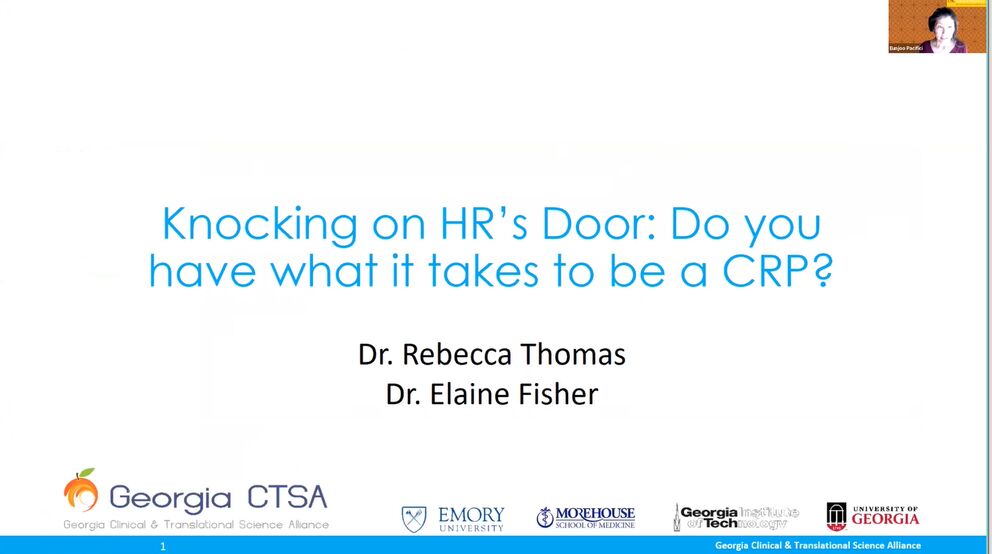- CRP Responsibilities
- Oversee all study activities associated with a clinical trial
- Manage multiple projects
- Train less experienced staff
- Schedule appointments, procedures, etc.
- Interact with study sponsors, monitors
- Create budgets
- Organized chaos
- Job Requirements
- Minimum Qualifications:
- Interpersonal skills, awareness of role, communication skills, right degree, technical skills, previous experience, maturity, perseverance/self-starter, decision making, and development potential
- For two levels of CRCs (minimum):
- High school diploma or GED, and three years of administrative support experience
- Bachelor’s in a health or science related field, and one year of clinical research experience
- Preferred Qualifications (Good-to-have qualities, but not required):
- Benefit to you: may lead to higher level of success in getting to the interview
- Benefit to the organization: assists the HR recruiter and search committee narrow down a big applicant pool and select top candidates
- How to get a job with no qualifications or experiences?
- Do NOT oversell
- Do identify your skill sets and gaps, be realistic, network, and volunteer
- Reach out to shared professional networks or professors that may be conducting research
- Contact volunteer office at your institution
- Minimum Qualifications:
- Leveled Positions; review the multiple levels and select which one is the best match
- CRC 1 (Entry Level)
- Responsible for administrative activities associated with the conduct of clinical trials. Completes source documents/case report forms and performs data entry. Maintains and stores research data. Assists with participant scheduling.
- CRC 2 (Entry Level)
- Manages research project databases, development study related documents, and completes source documents/case report forms. Interfaces with research participants and study sponsors. Determines eligibility and consents study participants according to protocol.
- CRC 3 (Intermediate Level)
- Independently manages significant and key aspects of a large clinical trial or all aspects of one or more small trials, or research projects. Trains and provides guidance to less experienced staff. Interfaces with research participants and resolves issues related to study protocol(s). Interacts with study sponsors, monitors and reports SAEs. Resolves study queries. Provides leadership in determining, recommending, and implementing improvements to policies and procedures. Monitors IRB submissions
- CRC 4 (Advanced Level)
- Functions as a team lead to recruit, orient, and supervise research staff. Independently manages the most complex research administration activities associated with the conduct of clinical trials. Determines effective strategies for promoting/recruiting/retaining research participants. Responds to requests and questions throughout the life cycle of the study
- CRC 1 (Entry Level)
- Clinical Research Coordinators
- Transferable Skills
- Associated with entry level positions
- Internet-available resume templates focused on generalities
- Academic Preparation
- Technical diplomas/certificates
- Degrees in health-related fields
- Clinical Settings and Clinical Roles
- Hiring Process
- Hiring Manager/PI Initiates Hiring Request
- HR Approves Request
- Hiring Manager/PI Develops Job Description
- Use of Standard Job Description
- Customized Description and/or Qualifications
- Submit Job Description
- Reviewed by HR Recruiter → Position Posted
- Applicant Resumes Submitted
- HR Recruiter Screens for Qualifications
- No → Reject resume
- Yes → HR Recruiter Reviewers Resume
- No → Reject resume
- Yes → HR Recruiter selects top candidates to send to hiring manager/PI
- Hiring Manager/PI Reviews Resumes
- No → Reject
- Yes → Advance to Interview
- Hiring Decision
- Yes → Hire
- No → HR Recruiter Reviews Resumes (Repeat partial process)
- A view from the HR recruiter seat:
- 21,623 total CRC applications in one year
- 11838 CRC1, 7705 CRC2, 1594 CRC3, and 486 CRC4 applications
- Only 158 CRC positions in one year
- 54 CRC1, 78 CRC2, 20 CRC3, and 6 CRC4 positions
- Time to fill the position:
- On average 55/56 days for CRC 1, 2, and 4
- On average 75 days for CRC 3
- Range of time from 1 day to 292 days
- Hiring managers want “accurate matching the candidate to the project needs leading to rapid project initiation without excess training”
- Top five ranked tasks/competencies for a CRC position:
- Administrative Activities (95%)
- Screening, Recruiting, Consenting, and Educating Study Subjects (89%)
- Develops and Maintains Study Related Documents (89%)
- Collecting and Entering Case Report Forms (ECRF’s) (84%)
- Recognizing and Managing Adverse Events (65%)
- Rank order of factors influencing the decision to hire a CRC, from most important to least important:
- Skill Set (73%)
- Years of Experience (46%)
- Educational Background (51%)
- Budgeted Salary (78%)
- 89% of hires were for entry-level CRC I and II positions
- Commonality of tasks/competencies selected as top five requirements, but no pattern emerged for the type of tasks/competencies required by CRC level
- 22% of PIs/Hiring Managers rated 50% or lower overall satisfaction with the hire, and approximately 16% of respondents would not hire the individual again
- While budgets were ranked fourth when hiring for a CRC position, comments by PI’s/Hiring Managers may indicate a lower level CRC hire may have been inadequate to meet project needs.
- 21,623 total CRC applications in one year
- Levering your value
- How to make your resume stand out
- Include relevant employment and academic dates - month/year
- Highlight experience
- Clinical roles, clinical research, areas of expertise in disease specialties, clinical skill set, experience with electronic data capturing systems, certifications from professional organizations, and trainings
- Retention strategies:
- Finding quality staff is not easy
- Onboarding (strong training component), mentoring (providing someone to reach out to in times of distress), resiliency (managing stress and burnout, recognition, career pathway, ongoing education (self-development)
- Manage your career
- Resources
- Translational Workforce Development (TWD) Free Course Catalog by Georgia CTSA in collaboration with SC CTSI
- Link: https://twd.ce.emorynursingexperience.com/
- Coming Soon: STELLAR Career Navigation
- CLIC
- Diamond
- National Institute of Health
- International Association of Clinical Research Nurses (IACRN)
- Association of Clinical Research Professionals and SOCRA
- How to make your resume stand out
- Questions
- Job descriptions need to be nationally standardized for an easier understanding
- From an HR point of view, receiving an offer in the United States is not reliant on having a referral; people need personalized resumes with specifics
- Transferable Skills
Regulatory Science Virtual Symposium: “Clinical Research Career Pathways” Session 6: Knocking on HR’s Door: Do You Have What it takes to be a CRP? (2021)
Career Development
Regulatory Science
Clinical Trials
Quality Science
Clinical Research
Human Resources
Clinical Research Coordinators (CRCs)
Course Syllabus/Topics
Acknowledgement
Accompanying text created by Omer Baker, BS Human Biology Candidate | omerbake@usc.edu | Edited by Annie Ly, MS Regulatory Science Candidate | lyannie@usc.edu


